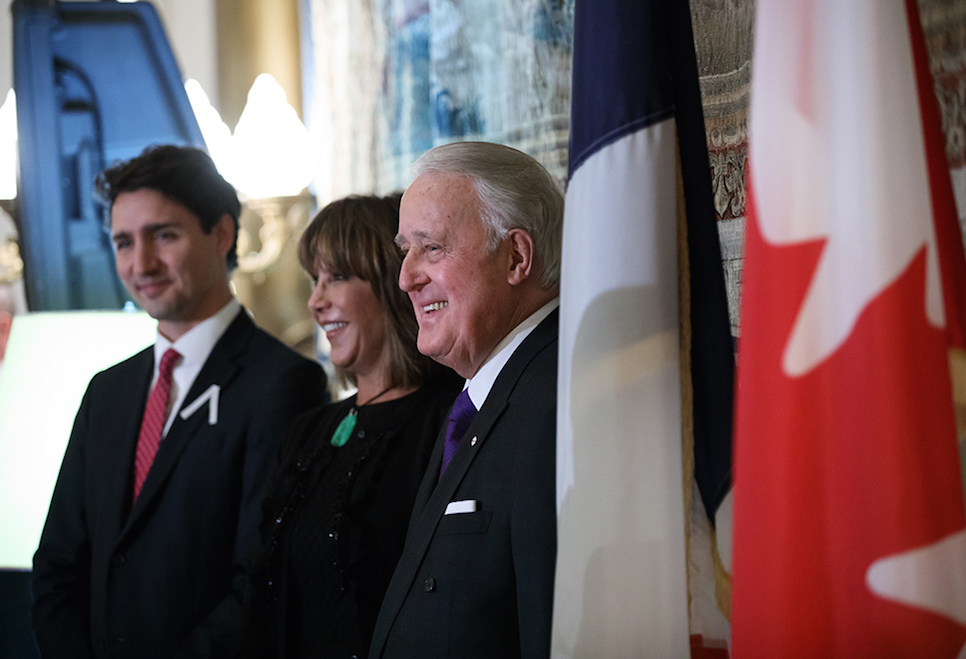Asked about Donald Trump, former prime minister Brian Mulroney responded, “he is a real gentleman.” For Mulroney, a lifelong friend of everything American, Trump will be good for Canada. He thinks the U.S. president and Justin Trudeau will develop a productive friendship.
Mulroney is merely the opening act in what will be a major Canadian media campaign to “normalize” the president-elect and showcase his program. Canadians will be expected to discount what Trump has said about women, Mexicans, Muslims or immigrants, as has Brian Mulroney, and another Trump Florida neighbour, Conrad Black. Big business voices will want citizens to focus on what President Trump and Canada can accomplish together.
Canadian coverage of the Republican soon to occupy the White House Oval Office draws back from either the mad Trump or the bad Trump take favoured by critics around the world. Little such restraint is evident in the U.S.
Taking an “only in America” theme, native Canadian Graydon Carter pinpointed why liberal America loathes the billionaire property developer. The Vanity Fair Editor’s Letter headline captures the tone: “Only in America could a man whose staff took away his Twitter account be given the nuclear codes.”
Watching Trump introduce three cabinet appointments from the executive floor at Goldman Sachs, plus previewing the Chief Executive Officer of Exon Mobil as Secretary of State, suggests Make America Great Again was really about Making American Capitalism Great Again.
Thanks to the Occupy movement, much attention has been drawn to how benefits under U.S. capitalism go to the top 1%. These gross inequalities were identified a decade ago in the income and wealth distribution studies of Thomas Piketty and Emmanuel Saez.
The most recent work by Piketty and Saez (with Gabriel Zucman) shows how the bottom 50 per cent of American society “has been completely shut off from economic growth.”
Trump wants to revitalize the American capitalist economy through pumping economic growth. But without some mechanism of redistribution of any new growth, half of Americans will still be left with stagnating incomes, just as for the last four decades.
Like Trump today, in 1981 Ronald Reagan wanted to reinvigorate American capitalism. His small-government, low-tax outlook replaced what Hyman Minsky called the Roosevelt-Keynesian policy synthesis, which started with the recognition that the U.S. economy needed big-government intervention and regulation in order to avoid financial crisis, recession and even 1930s-style depression.
The “New Democrat” orthodoxy adopted by Bill Clinton, and later by Barrack Obama, accepted much of the Reagan critique of government.
The failure of U.S. economic policy since Reagan to allow the bottom half of American society to make any headway is as much a responsibility of Democrats as of Republicans.
Bernie Sanders campaigned as a Democrat on the theme of how big money used Washington to bend government policy to protect itself, instead of providing economic opportunity and security for the majority of Americans.
The billionaire takeover of democracy is exemplified by Trump winning the White House.
Trump verbally stomps on teachers’ unions and public education. He pledges to abolish protection for the environment from fracking and drilling in national parks. Trump denies climate change. In a host of areas, his policy direction is likely to face considerable resistance from U.S. citizen groups.
Sanders advocated openly for democratic socialism with considerable (and unexpected) success.
As a result, there is a struggle within the Democratic Party over its future direction.
In Canada advocates of public child care, or better early childhood education, or pharmacare, or better funding for health care, continue to make a strong case. Determined environmental activism led by Indigenous nations is about to surprise the Trudeau government. Many Canadians are looking for new ways to build the economy.
Instead of looking for ways to accommodate Trump with a new partnership on energy policy or imitate him by cutting back on funding for health care and education, Canada could choose its own political options.
Indeed, the election of Donald Trump creates a new opportunity for Canada to distance itself from advocates of U.S.-style capitalism as the way ahead for the world.
Duncan Cameron is former president of rabble.ca and writes a weekly column on politics and current affairs.



